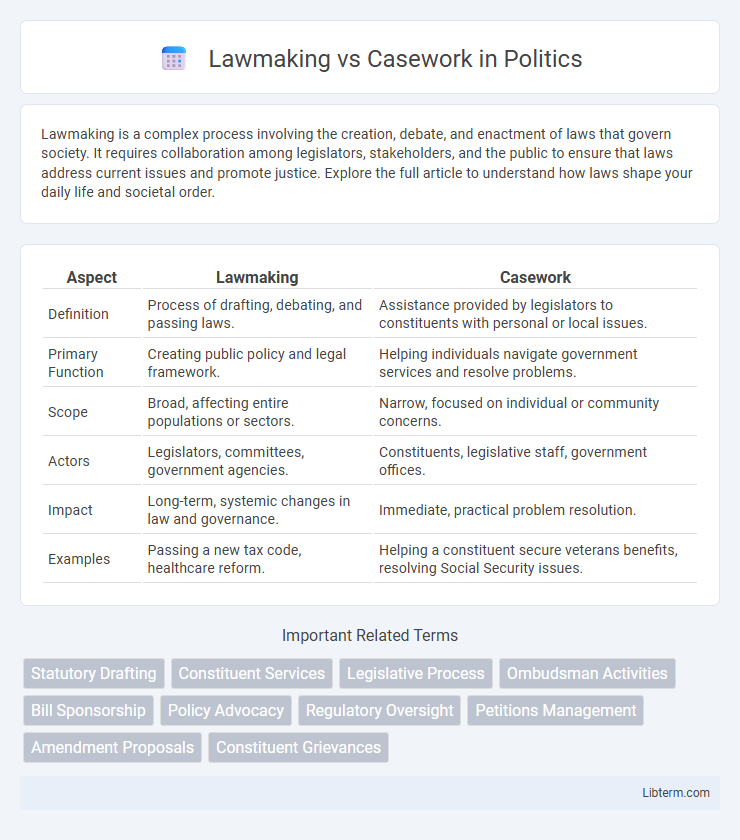Lawmaking is a complex process involving the creation, debate, and enactment of laws that govern society. It requires collaboration among legislators, stakeholders, and the public to ensure that laws address current issues and promote justice. Explore the full article to understand how laws shape your daily life and societal order.
Table of Comparison
| Aspect | Lawmaking | Casework |
|---|---|---|
| Definition | Process of drafting, debating, and passing laws. | Assistance provided by legislators to constituents with personal or local issues. |
| Primary Function | Creating public policy and legal framework. | Helping individuals navigate government services and resolve problems. |
| Scope | Broad, affecting entire populations or sectors. | Narrow, focused on individual or community concerns. |
| Actors | Legislators, committees, government agencies. | Constituents, legislative staff, government offices. |
| Impact | Long-term, systemic changes in law and governance. | Immediate, practical problem resolution. |
| Examples | Passing a new tax code, healthcare reform. | Helping a constituent secure veterans benefits, resolving Social Security issues. |
Introduction to Lawmaking and Casework
Lawmaking involves the formal process by which legislatures draft, debate, and enact laws to address societal needs and regulate behavior. Casework refers to the assistance provided by legislators to individual constituents in resolving issues with government agencies or navigating bureaucratic challenges. Both functions are essential: lawmaking shapes public policy, while casework strengthens representative-constituent relationships and addresses immediate practical concerns.
Defining Lawmaking: Purpose and Process
Lawmaking involves the creation and enactment of statutes by legislative bodies to establish legal standards and regulations that govern society. The process typically includes drafting bills, committee review, debate, voting, and executive approval, ensuring laws reflect public policy goals. Its primary purpose is to provide a structured framework for governance, addressing societal issues through codified rules.
Understanding Casework: Functions and Importance
Casework involves legislators assisting constituents with personal or systemic issues, serving as a vital bridge between the public and government services. It ensures responsive governance by addressing individual concerns such as Social Security claims, immigration status, and veteran benefits, enhancing trust and accountability. Effective casework strengthens community relationships and provides lawmakers with practical insights to inform policy decisions.
Key Differences Between Lawmaking and Casework
Lawmaking involves crafting, debating, and enacting legislation that establishes broad legal frameworks affecting entire populations, while casework addresses individual constituents' needs and problems by assisting with government services or resolving bureaucratic issues. Legislators engage in lawmaking by drafting bills, participating in committees, and voting on policies, whereas casework requires direct communication and problem-solving to provide personalized support. The primary difference lies in lawmaking's systemic, policy-driven scope versus casework's focused, constituent-specific assistance.
Roles of Legislators in Lawmaking
Legislators play a crucial role in lawmaking by drafting, debating, and voting on bills that shape public policy and address constituents' needs. Their responsibilities include researching issues, consulting with experts, and negotiating with fellow lawmakers to create effective and enforceable laws. Legislators also participate in committee hearings and amendments to refine legislation before it reaches the final vote.
Roles of Legislators in Casework
Legislators play a crucial role in casework by acting as intermediaries between constituents and government agencies, addressing individual concerns related to social security, veterans' benefits, and immigration issues. Their involvement ensures that bureaucratic obstacles are navigated efficiently, providing personalized assistance and facilitating problem resolution. This direct constituent service complements their legislative duties, enhancing public trust and responsiveness within the political system.
Impact of Lawmaking on Society
Lawmaking shapes societal structures by establishing regulations that govern behavior, protect rights, and promote public welfare. It creates a framework for economic growth, social justice, and environmental protection, directly influencing citizens' quality of life. Effective laws deter crime, ensure equal opportunities, and facilitate peaceful coexistence within diverse communities.
Impact of Casework on Constituents
Casework directly addresses constituents' individual needs, providing personalized assistance with government agencies and navigating bureaucratic challenges. This hands-on support often results in faster problem resolution, increased trust in elected officials, and stronger community relationships. Constituents experience tangible benefits, such as securing Social Security benefits or veterans' services, enhancing overall satisfaction with representation.
Challenges in Balancing Lawmaking and Casework
Balancing lawmaking and casework poses significant challenges for legislators, as both demand considerable time and resources. Lawmaking requires extensive research, negotiation, and collaboration to draft and pass comprehensive policies, while casework involves addressing individual constituents' issues and navigating bureaucratic hurdles. This dual responsibility often leads to time management conflicts, prioritization dilemmas, and potential compromises in legislative effectiveness or constituent service quality.
Conclusion: Lawmaking vs. Casework in Effective Governance
Effective governance requires a balance between lawmaking and casework, as legislation sets broad policies while casework addresses individual constituent needs. Lawmaking creates systemic changes through statutes and regulations, whereas casework fosters trust and responsiveness at the local level. Integrating both efforts enhances accountability and ensures comprehensive public service delivery.
Lawmaking Infographic

 libterm.com
libterm.com